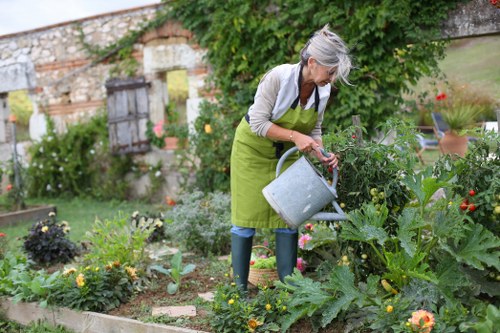Comprehensive Guide to Garden Maintenance in Manor Park
Introduction to Garden Maintenance

Maintaining a beautiful garden requires dedication, knowledge, and the right set of tools. In Manor Park, where the climate and soil conditions are unique, understanding the specific needs of your garden is essential. Whether you are a seasoned gardener or a novice, this guide will provide valuable insights into effective garden maintenance practices tailored for Manor Park residents.
Garden maintenance encompasses a variety of tasks, from planting and pruning to soil management and pest control. Each of these elements plays a crucial role in ensuring that your garden remains lush, healthy, and vibrant throughout the year.
By following the tips and strategies outlined in this article, you can achieve a thriving garden that enhances the beauty of your Manor Park home and provides a serene outdoor space for relaxation and enjoyment.
Understanding Manor Park’s Climate

Manor Park experiences a temperate climate with mild summers and cool winters. This climate is conducive to a wide range of plant species, but it also presents specific challenges that gardeners must navigate. Understanding the local weather patterns, rainfall levels, and temperature fluctuations is vital for successful garden maintenance.
Spring in Manor Park brings moderate temperatures, ideal for planting a variety of flowers and vegetables. However, the unpredictable rainfall can affect seed germination and plant growth. Adequate drainage and soil preparation are necessary to prevent waterlogging and ensure healthy plant development.
Summer months require careful watering practices to cope with the dry spells. Implementing efficient irrigation systems and mulching can help retain soil moisture and reduce water consumption. Additionally, protecting plants from excessive heat through shading and proper ventilation is essential.
Soil Preparation and Management

The foundation of a healthy garden lies in well-prepared soil. In Manor Park, the soil composition can vary, so it’s important to conduct a soil test to determine its pH level, nutrient content, and texture. Based on the results, you can amend the soil to create optimal growing conditions for your plants.
- Soil Testing: Conducting a soil test helps identify deficiencies and excesses in nutrients, allowing you to make informed decisions about fertilization and amendments.
- Organic Matter: Incorporating organic matter such as compost improves soil structure, enhances nutrient availability, and promotes beneficial microbial activity.
- Mulching: Applying mulch helps retain soil moisture, suppress weeds, and regulate soil temperature, creating a more stable environment for plant roots.
Regularly aerating the soil prevents compaction and ensures adequate air circulation to plant roots. Additionally, practicing crop rotation and cover cropping can enhance soil fertility and reduce the risk of pests and diseases.
Plant Selection and Care

Choosing the right plants is crucial for a successful garden in Manor Park. Select species that are well-suited to the local climate, soil conditions, and sun exposure levels in your garden. Native plants often require less maintenance and are more resilient against local pests and diseases.
When planting, consider the mature size of plants to prevent overcrowding, which can lead to poor air circulation and increased susceptibility to diseases. Spacing plants appropriately allows them to grow healthily and reduces the need for frequent pruning.
Pruning and Trimming
Regular pruning and trimming are essential for maintaining plant health and aesthetics. Removing dead or diseased branches promotes better air flow and encourages new growth. Proper pruning techniques vary depending on the plant species, so it’s important to research the specific needs of each plant in your garden.
- Deadheading: Removing spent flowers encourages continuous blooming and prevents the plant from expending energy on seed production.
- Shape Maintenance: Trimming plants to maintain their desired shape enhances the overall appearance of the garden and ensures plants grow in a structured manner.
- Health Management: Regularly inspecting plants for signs of pests or diseases allows for timely intervention, preventing the spread to other plants.
Pest and Disease Control

Managing pests and diseases is a critical aspect of garden maintenance in Manor Park. Integrated Pest Management (IPM) practices offer an eco-friendly approach to controlling unwanted insects and pathogens without relying heavily on chemical pesticides.
- Identification: Accurately identifying pests and diseases ensures that the appropriate control measures are implemented.
- Biological Controls: Introducing natural predators, such as ladybugs and parasitic wasps, can help keep pest populations in check.
- Cultural Practices: Maintaining good garden hygiene, such as removing dead plant material and encouraging healthy plant growth, can reduce the incidence of pests and diseases.
- Chemical Controls: When necessary, using targeted and environmentally friendly pesticides can help manage severe infestations with minimal impact on beneficial organisms.
Regular monitoring and early detection are key to effective pest and disease management. By staying vigilant and proactive, gardeners in Manor Park can maintain a healthy and thriving garden.
Irrigation and Watering Techniques

Proper irrigation is essential for garden maintenance, especially in areas like Manor Park that experience varying rainfall patterns. Efficient watering practices ensure that plants receive the right amount of moisture without overwatering, which can lead to root rot and other issues.
Implementing drip irrigation systems can provide targeted watering directly to the plant roots, reducing water waste and minimizing evaporation. Additionally, watering early in the morning or late in the evening helps retain moisture and prevents the growth of mold and fungi.
Using rain barrels to collect and store rainwater is an eco-friendly way to supplement your garden’s water supply. This not only conserves water but also provides plants with naturally soft water, which is beneficial for their growth.
Seasonal Garden Maintenance
Adapting your garden maintenance routine to the changing seasons is crucial for year-round plant health and beauty. Each season in Manor Park presents unique challenges and opportunities for gardening.
Spring Maintenance
- Planting: Spring is the ideal time to plant new flowers, shrubs, and vegetables as the weather begins to warm.
- Soil Preparation: Enriching the soil with compost and fertilizers provides essential nutrients for new plant growth.
- Pruning: Trimming back perennials and preparing trees and bushes for the growing season promotes healthy development.
Summer Maintenance
During the summer months, focus on watering, mulching, and controlling pests to keep your garden thriving despite the heat. Regularly checking for signs of stress in plants allows for timely interventions.
Autumn Maintenance
- Leaf Management: Raking and composting fallen leaves helps prevent fungal diseases and enriches the soil.
- Plant Protection: Preparing plants for the cooler months by applying mulch and securing tender specimens protects them from frost.
Winter Maintenance
In winter, focus on protecting your garden from harsh weather conditions. Pruning dormant plants, clearing debris, and planning for the next growing season ensure that your garden remains in good condition.
Tools and Equipment for Effective Maintenance
Having the right tools is essential for efficient garden maintenance in Manor Park. Investing in quality equipment not only makes tasks easier but also ensures that your garden care is performed effectively.
- Pruning Shears: Essential for trimming and shaping plants with precision.
- Garden Fork: Useful for aerating soil and removing weeds.
- Irrigation Systems: Automated systems help maintain consistent watering schedules.
- Soil Test Kits: Allow for regular monitoring of soil health and nutrient levels.
Regular maintenance of tools, such as cleaning and sharpening blades, extends their lifespan and ensures they remain effective for garden tasks.
Eco-Friendly Gardening Practices
Adopting eco-friendly gardening practices contributes to a sustainable environment and promotes the health of your garden. Manor Park gardeners can implement various strategies to minimize their ecological footprint while maintaining a beautiful outdoor space.
- Composting: Recycling organic waste into compost enriches the soil and reduces landfill waste.
- Native Plants: Choosing native species supports local biodiversity and requires less maintenance.
- Water Conservation: Using rainwater harvesting and efficient irrigation systems conserves water resources.
- Organic Pest Control: Utilizing natural remedies and biological controls reduces reliance on chemical pesticides.
By integrating these practices into your garden maintenance routine, you can create a harmonious and sustainable garden environment.
Landscaping and Design Tips
A well-designed garden enhances the aesthetic appeal of your Manor Park home and provides a relaxing outdoor sanctuary. Thoughtful landscaping and design choices contribute to the overall functionality and beauty of your garden space.
Plant Arrangement
Organizing plants based on their height, color, and bloom time creates a visually appealing and balanced garden layout. Taller plants can serve as focal points, while lower-growing species add texture and contrast.
Pathways and Structures
- Pathways: Winding paths made of stone or gravel guide visitors through the garden and prevent soil compaction.
- Garden Structures: Incorporating elements like pergolas, trellises, and benches provides functional spaces for relaxation and adds architectural interest.
Strategically placed lighting illuminates pathways and highlights key features, enhancing the garden’s ambiance during evening hours.
Seasonal Planting Schedules
Planning your planting schedule according to the seasons ensures that your garden remains vibrant and productive throughout the year. Understanding the optimal planting times for different plant species maximizes growth potential and bloom periods.
- Spring: Ideal for planting annuals, vegetables, and perennials that thrive in cooler temperatures.
- Summer: Best for heat-tolerant plants, succulents, and late-season vegetables.
- Autumn: Suitable for planting bulbs, shrubs, and trees that require time to establish before winter.
- Winter: Focus on planning and preparing for the next growing season, as well as caring for evergreen plants.
By adhering to a seasonal planting schedule, you can ensure continuous growth and a dynamic, ever-changing garden landscape.
Maintenance Schedule and Checklist
Creating a maintenance schedule helps organize garden tasks and ensures that nothing is overlooked. A comprehensive checklist tailored for Manor Park gardens can streamline your maintenance routine and promote consistent care.
- Weekly Tasks:
- Inspect plants for signs of pests or diseases.
- Water plants as needed, especially during dry spells.
- Weed garden beds to prevent competition for nutrients.
- Monthly Tasks:
- Prune and trim overgrown plants.
- Fertilize plants based on their specific needs.
- Rotate crops in vegetable gardens to maintain soil health.
- Seasonal Tasks:
- Spring: Prepare soil, plant new additions, and set up irrigation systems.
- Summer: Monitor for pests, manage weeds, and ensure adequate watering.
- Autumn: Clean up fallen leaves, mulch beds, and protect plants from frost.
- Winter: Prune dormant plants, plan next season’s garden, and maintain tools.
Maintaining a consistent schedule not only keeps your garden in optimal condition but also makes the maintenance process more manageable and less time-consuming.
Choosing Professional Garden Maintenance Services
While DIY garden maintenance can be fulfilling, hiring professional services ensures that your Manor Park garden receives expert care. Professional gardeners bring specialized knowledge, experience, and resources to maintain your garden effectively.
- Expertise: Professionals understand the local climate, soil conditions, and plant varieties, allowing them to make informed decisions about garden care.
- Time-Saving: Outsourcing maintenance tasks frees up your time, enabling you to enjoy your garden without the stress of upkeep.
- Quality Results: Professional services ensure that all aspects of garden maintenance are performed to the highest standards, resulting in a beautiful and healthy garden.
When selecting a garden maintenance service, consider factors such as experience, reputation, and the range of services offered to find the best fit for your needs.
Conclusion
Effective garden maintenance in Manor Park involves a combination of proper planning, regular care, and an understanding of the local environment. By implementing the strategies and practices discussed in this guide, you can cultivate a thriving garden that enhances the beauty of your home and provides a peaceful retreat.
Remember, a well-maintained garden not only offers aesthetic pleasure but also contributes to your overall well-being by creating a harmonious and relaxing outdoor space.
Ready to transform your garden? Contact us today to book your garden maintenance service and take the first step towards a gorgeous Manor Park garden.

